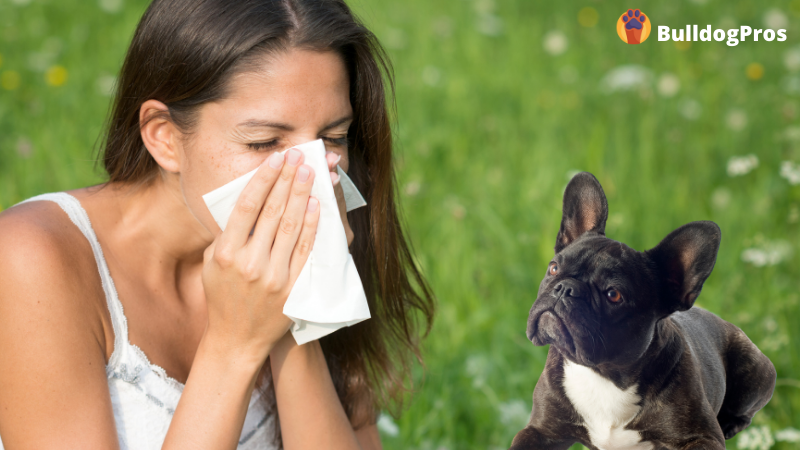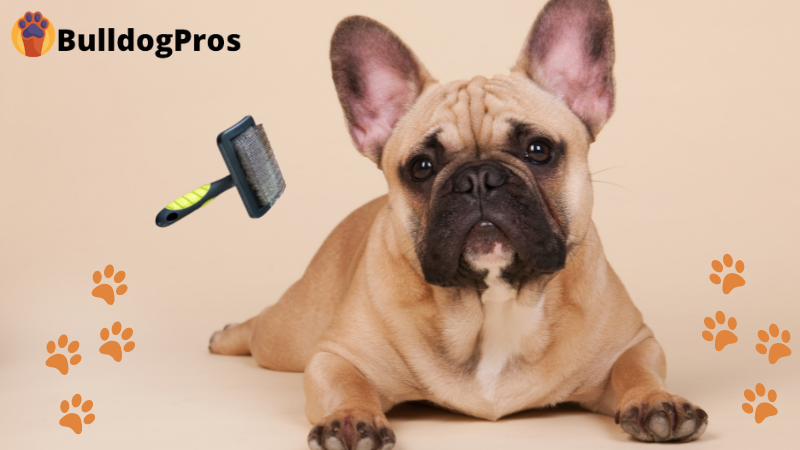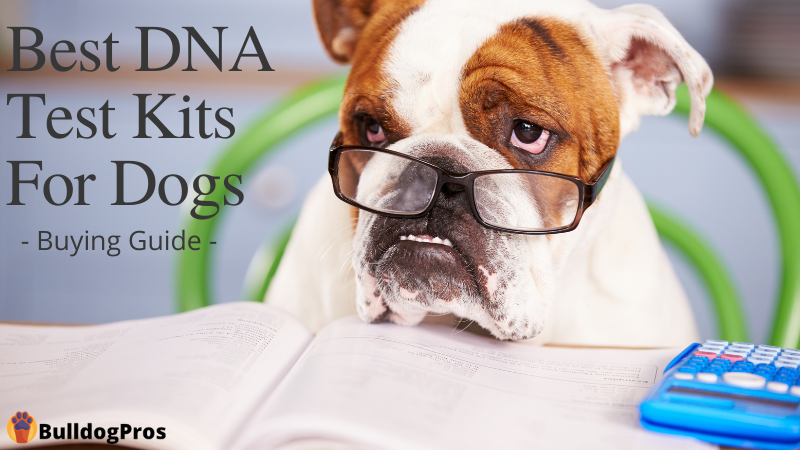As a devoted dog lover, I understand the importance of finding a furry companion that fits seamlessly into your life. However, for individuals with allergies, selecting the right breed can be a crucial decision. In this article, we will delve into the fascinating world of French Bulldogs and explore the burning question: Are French Bulldogs hypoallergenic?
Video: Are French Bulldogs Hypoallergenic?
Are Frenchies Hypoallergenic?
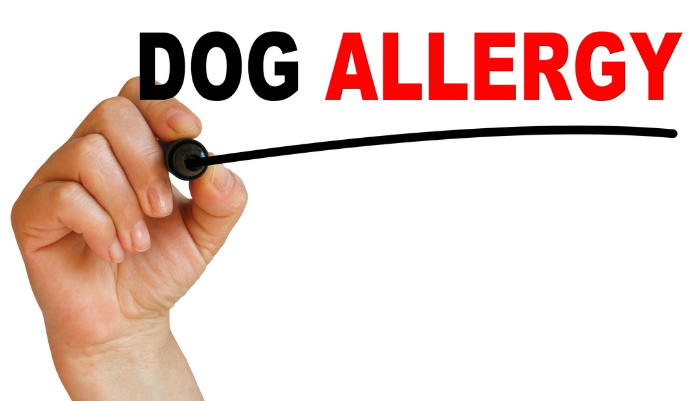
Allergy sufferers who are also pet lovers have a tough time finding that perfect companion that will not make them have itchy eyes, sneezing fits, sniffles, or wheezing. It can be a heartbreaking decision to forego a furry friend for this reason.
Some dogs are hypoallergenic to people and do not cause typical allergic reactions in their owners. However, there isn’t any completely hypoallergenic dog breed there are those that are more so than others.
Are French Bulldogs Hypoallergenic?
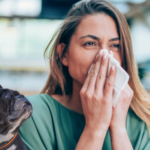
Unfortunately, for those who love French Bulldogs, this adorable breed is not thought to be hypoallergenic and can trigger allergic reactions in those who suffer from dog allergies. French Bulldogs can, in fact, be more allergic reaction-inducing than most other dogs.
Frenchies are indeed low-maintenance dogs, requiring little maintenance, but they do have skin issues that cause heavy shedding. It happens a couple of times a year, usually seasonally, as the dog’s coat readies itself for the next season.
Frenchies are also known for having sensitive skin issues that can aggravate a person’s allergies. Dermatitis is common in French Bulldogs. This usually occurs where their skin forms a fold, and the result can be an even worse reaction with your allergies.
In addition to fur and dry, flaky skin, which can bother you, Frenchies are also known to be very slobbery dogs.
Dog saliva contains specific proteins found in their fur, urine, and dander, which can be especially tough on a person’s immune system.
With Frenchies, it is usually their saliva that is the biggest culprit for human allergies.
So, should someone with dog allergies consider adopting one of these sweet dogs? Most experts say no, and that it would be best to consider other dog breeds that are more gentle on the immune system.
Signs You Are Allergic To French Bulldogs

How can you tell you are allergic to Frenchies? Generally, if you have pet allergies and if you spend time in close contact with a dog, you will likely develop any or all of the following allergic symptoms:
- Coughing
- Nasal Congestion
- Red, Watery, Or Itchy Eyes
- Runny Nose
- Shortness of Breath
- Skin Rashes, Itching, Or Hives
- Wheezing
How Will I Know If The French Bulldog is Hypoallergenic for Me?
If you cannot be deterred and feel you must have a Frenchie, experts suggest you spend time around a friend’s dog first to see how bad your allergies flare up.
Everyone’s immune system is different, and there is a chance your reaction will not be as extreme as someone else’s.
Just bear in mind that your allergic reaction depends a lot on the individual dog to which you are exposed – not all Frenchies will cause the same reaction. It is possible to have a mild reaction to a friend’s dog but a much more severe reaction to a different dog.
Experts suggest that you spend at least an hour with the specific dog you would like to adopt before you take that cute little Frenchie home. Then, wait to see what kind of reaction you have.
If, after spending time with a Frenchie, you’re still set on making one a part of the family, regardless of your reaction, there are some steps you can take to reduce the effects of allergens on your new family member.
Tips To Reduce Allergies To Your Frenchie
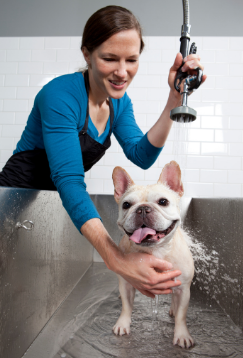
Air Purifier:
The purpose of an air purifier is to eliminate contaminants in the air, such as, but not limited to, dust, smoke, pollen, mold, and dander. So if you suffer from allergies an air purifier can be of value in helping eliminate dander from your shedding dog.
Groom:
First, keep the dog well-groomed at all times. You will have to have your Frenchie groomed regularly to remove fur, dry skin, and dander.
Baths can significantly help reduce the amount of hair and dander your dog sheds, making them more allergy-friendly.
Furniture:
Although it might be difficult, keep your Frenchie off your furniture, especially any furniture you will spend time on. Dogs can leave their hair and dander behind, just waiting for you to come around and upset your allergies.
Keep your and your Frenchies’ linen and bedding well washed. This includes your dog’s bed, soft toys, blankets, and towels.
Vacuum:
Similarly, make sure to thoroughly vacuum all areas of your home to keep your dog’s hair, skin, and dander to an absolute minimum.
Using a vacuum cleaner with a disposable bag will also help – this way, you can toss the entire bag and never worry about emptying a canister, possibly spreading allergens through the air.
T-Shirt
Put your Frenchie in a cute dog T-shirt. Not only will your buddy look cute, but the shirt can also help contain any hair, skin, and dander shed by your dog. Just be sure to change the shirt regularly and keep them well washed.
Help Is Available
Medication:
If your reactions are severe enough, you should ask your doctor about allergy medication that can help reduce the severity of any reactions you may have.
There is no guaranteed way to ensure you will not react, but medications can make them much more bearable.
Allergy Shots:
A trip to the allergist might help as well. You can get shots to help build your immune system and lessen your allergic reaction.
Other Breeds:
You can also look at crossbreeds – meaning dogs that are a mix of a French Bulldog and another breed.
It is possible to find a combination of dog breeds that will give you all the adorableness and personality Frenchies are known for but possibly without as many allergens.
One such crossbreed suggested by experts is a French Boodle – a mix of a French Bulldog and a Poodle. Poodles are generally a more suitable choice of dog for allergy sufferers due to their reduced dander and shedding levels.
We’ve already mentioned the Poodle, but other hypoallergenic dogs to consider are the Maltese Poodle, Shih-Tzu, West Highland Terrier, Chinese Crested, Labradoodle (a crossbreed of Labrador Retrievers and Poodles), Samoyed, and the Italian Greyhound.
Table: 7 Hypoallergenic Dog Breeds
| Image | Breed | Allergy Characteristics |
 | Chinese Crested | The Chinese Crested dog, unlike some other breeds, doesn’t drool so the protein that is found in saliva isn’t readily present. Additionally, considered to be hairless dogs they shed very little (they do have some hair). |
 | Italian Greyhound | Another breed that doesn’t shed or typically drool the Italian Greyhound is considered a hypoallergenic dog breed. |
 | Labradoodle | The Labradoodle is a mix between a Labrador Retriever and a Poodle. The Poodle is a nonshedding dog, however, the Labrador Retriever does shed. Knowing this, some Labradoodles are considered hypoallergenic while others are not. |
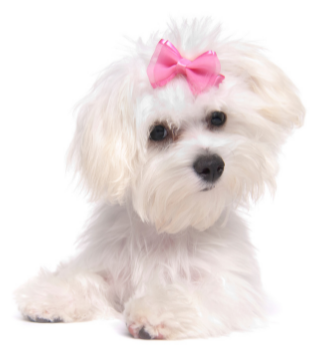 | Maltese Poodle | Like the Poodle, the Maltese Poodle is mostly a non-shedding dog. In fact, the Maltese Poodle is one of the most hypoallergenic dog breeds making them a good choice if you have allergies. However, there is no guarantee that you will be allergy-free with one. |
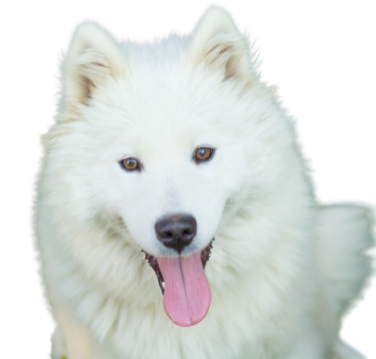 | Samoyed | Though Samoyeds have long hair and do shed twice a year they are considered to be a good choice for allergy sufferers. This is because they produce less dander than many other dog breeds. |
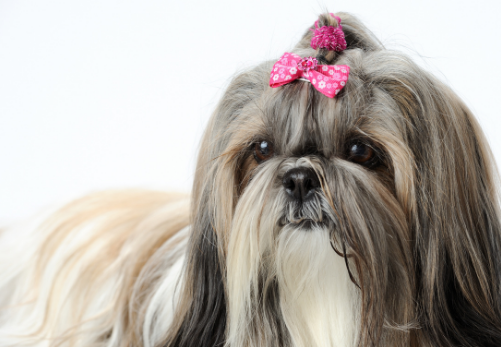 | Shih-Tzu | The hair of a Shih-Tzu is more like human hair than dog fur. Because of this, they do not produce a lot of dander. However, they are not dander-free and you may experience allergy symptoms if you are very sensitive to dander. |
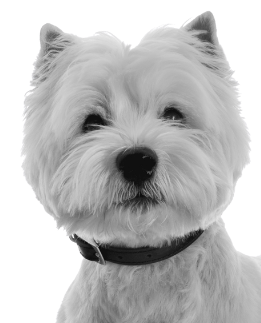 | West Highland Terrier | The West Highland Terrier rarely sheds and has low dander levels. |
Although they vary in size, these breeds all have big personalities and very loving natures. And although they are not our beloved Frenchies, they all make wonderful pets and additions to families.
The American Kennel Club has also released a list of breeds that are thought to be more hypoallergenic than others, and your veterinarian can also help you guide you in your choice. Their list includes breeds that aren’t as common as the ones mentioned here but you still might be interested in:
Table: AKC List of Hypoallergenic Breeds
| Affenpinscher | Afghan Hound | American Hairless Terrier | Barbado da Terceira | Bedlington Terrier |
| Bichon Frise | Bolognese | Chinese Crested | Coton de Tulear | Miniature, Standard, and Giant Schnauzer |
| Irish Water Spaniel | Kerry Blue Terrier | Lagotto Romagnolo | Lowchen | Maltese |
| Peruvian Inca Orchid | Miniature, Toy, and Standard Poodle | Portuguese Water Dog | Russian Tsvetnaya Bolonka | Soft Coated Wheaten Terrier |
| Xoloitzcuintli | Yorkshire Terrier |
Popular Posts
You Might Also Be Interested In Reading: The White French Bulldog or Blue French Bulldog
Conclusion
To conclude, if you are considering bringing a French Bulldog into your home but have allergies, it’s essential to approach the hypoallergenic aspect with realistic expectations.
In reading, Are French Bulldogs Hypoallergenic? What You Need To Know we found that French Bulldogs are not hypoallergenic and explored how allergy sufferers might respond to the breed. You also learned some tips that might help lessen the effects of allergies.
Do not hurry your decision to get a Frenchie. Please be confident you can maintain all the steps needed to reduce allergic reactions before bringing your puppy home.
Do you have dog allergies, and how have they affected your ability to own a dog? Please comment below.
